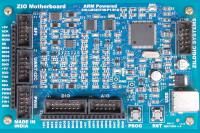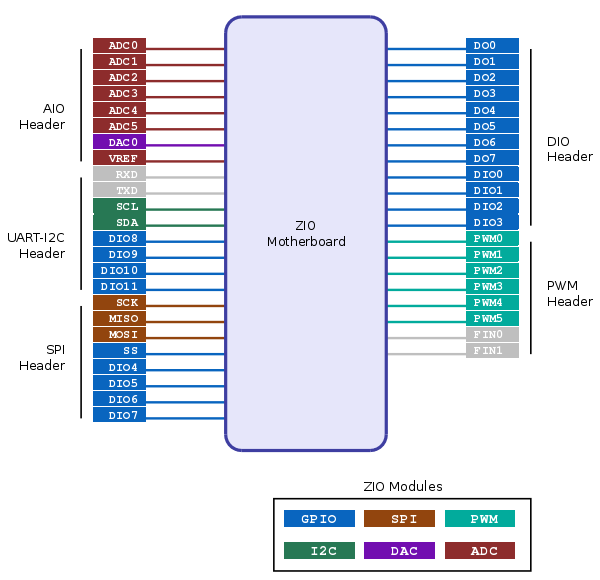ZIO, Prototyping Platform

ZIO is a platform to move embedded development from micro-controllers to the PC, for rapid prototyping. This acheived by extending the IO capabilities of the PC through an USB based add-on ZIO motherboard. The IO interfaces on the ZIO motherboard can be accessed and controlled using high level languages — Python and Java, further simplifying prototype development.

Features
The ZIO offers the following features:
-
Connects to PC through USB
-
Interfaces - GPIO, PWM, ADC, DAC, SPI, I2C
-
Host-side API for programming the ports
-
APIs available for Java and Python
-
API documentation for easy reference
-
Port interfacing guidelines for common scenarios
-
GUI based Control Panel to explore the board
-
On-field firmware upgrade through USB
Extension Connectors
ZIO has a well defined IO connector interfaces for I2C, SPI, PWM, GPIO and AIO. It has standard FRC headers for extension. Add-on boards can be connected to these headers for exploring or building products
-
10 pin header for I2C
-
10 pin header for SPI
-
10 pin header for AIO
-
10 pin header for PWM
ZIO can be powered from
-
USB from PC
-
5V External power supply with USB mini connector
Documentation
ZIO is backed by extensive documentation in the form of manuals, API reference and tutorials in the internet. The currently available documentation from Zilogic is listed below.
Software
Zilogic provides a Board Support Package (BSP) which has software development tools for both Windows and Linux. BSP contains
-
JDK, for Windows
-
Python, for Windows
-
ZIO Java API
-
ZIO Python API
-
ZIO Control Panel - A GUI based software to control and configure ZIO hardware
Downloads
Board Support Package (BSP) can be downloaded from below links. BSP can be downloaded as CD-ROM ISO file or as individual software tools.
Related Articles
Here are some related articles in Zilogic Blog, this might help you get started with the board.